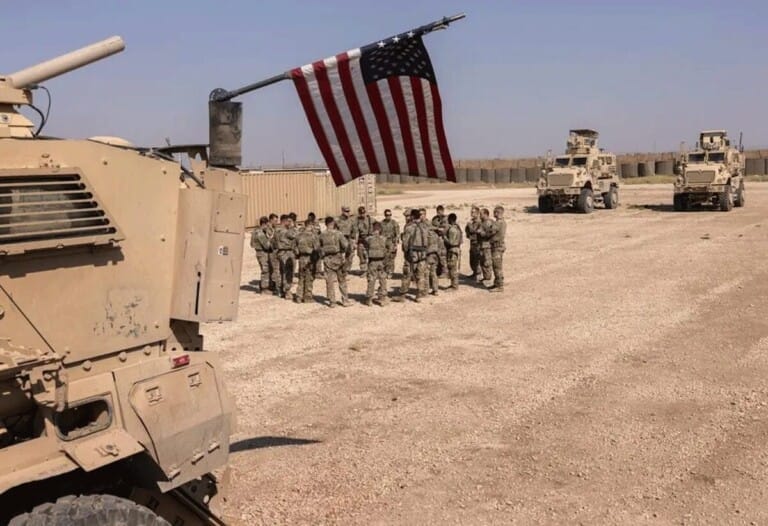Are U.S. troops finally charting a course out of Iraq? In the bustling corridors of power where the fate of foreign military presence hangs in the balance, a consequential dialogue unfolds. Iraq and the United States recently engaged in pivotal talks to discuss the future footprint of American and coalition forces on Iraqi soil. These initial discussions could mark the dawn of a new military stance in Iraq, with Baghdad pushing for a definitive timeline to scale back foreign troops.
The Genesis of Strategic Negotiations
Saturday bore witness to a historic engagement between Iraq and the United States as the two nations sit across the table to deliberate the tenure of American forces in Iraq. Official Iraqi channels released imagery of Prime Minister Mohamed Shia al-Sudani in conference with high-ranking members of both the Iraqi military and the international coalition. The dialogue is set to chart the course for the coalition’s mission’s termination.
The stakes are high, and the Iraqi government’s expectation is clear: these talks should forge a path toward a reduced military presence. Sudani’s foreign affairs adviser, Farhad Alaaldin, indicated the discussions’ outcome would frame the negotiation’s duration, underscoring their significance. Iraq aims to craft bilateral agreements that mutually benefit both its sovereignty and the strategic interests of coalition countries.
Read: US, UK Airstrikes Aim at Strategic Yemen Port
Scrutinizing the Coalition’s Advisory Role
As the U.S. and Iraq explore the operational landscape, key elements come under the spotlight: the persisting threat from ISIS, current operational and environmental nuances, and the capabilities of Iraqi Security Forces. The talks are not just a mere formality but a strategic analysis to gauge the necessity of the coalition’s advisory role on Iraqi grounds.
The U.S. acknowledges that the size of its military footprint is a negotiable aspect of these conversations. This is in response to Baghdad’s aspiration for a downsized foreign military presence. Conversely, the Iraqi foreign ministry envisions these dialogues to culminate in a “specific and clear timeline,” setting the stage for a phased withdrawal of coalition advisors.
The Echoes of Regional Tensions
These negotiations occur amidst a backdrop of escalating regional tensions, notably the conflict between Israel and Hamas. This strife has incited a spate of over 150 attacks on coalition forces since mid-October, with many claimed by Iran-affiliated factions opposing U.S. support for Israel. These developments underscore the precarious nature of foreign troop presence in an already volatile region.
The current military composition consists of approximately 2,500 U.S. troops in Iraq and about 900 in Syria, all part of the broader anti-IS coalition established in 2014. The dialogue’s outcome may significantly reshape this deployment, reflecting shifting geopolitical priorities and Iraq’s sovereignty aspirations.
Balancing the Scales: Iraq’s Sovereignty vs. Coalition Objectives
Iraq’s push for a timeline to draw down coalition forces is not merely a sovereignty issue but also a balancing act of security and international relations. Baghdad must navigate this complex web of regional dynamics, counterterrorism efforts, and the aspirations of its people who increasingly call for autonomy from foreign influence.
Simultaneously, the coalition must evaluate the progress against ISIS and the readiness of Iraqi forces to take the reins completely. This balancing act is critical to ensure that the withdrawal neither compromises Iraq’s security nor diminishes the strides made against terrorism in the region.
The Economic Implications of a Military Drawdown
The presence of foreign troops has economic dimensions that extend beyond the immediate military considerations. A reduced foreign military footprint could pave the way for increased Iraqi control over their resources and economic policy-making, which in turn could foster a more stable and conducive environment for foreign investment and economic growth.
However, the economic impact of such a drawdown must be carefully managed. For Iraq, building economic resilience amid reduced foreign presence involves bolstering internal security forces and combating any resurgence of extremism that could deter investment and destabilize the economy.
The Path Forward: A Reshaped Coalition Presence
As expert working groups of military and defense professionals convene to dissect the operational realities, a new shape of coalition presence begins to form. Iraq’s expectation for a clear reduction timetable suggests a future where its forces are poised to assume greater control and responsibility.
The potential reshaping of the coalition’s military presence in Iraq reflects a broader trend towards respecting national sovereignty while maintaining the necessary support to combat shared security threats like ISIS. This delicate transition demands a nuanced approach, ensuring stability and continued partnership.
A Historic Moment of Transition
The ongoing negotiations between Iraq and the United States signify a potential turning point in the countries’ military and diplomatic relationship. As Iraq asserts its right to self-determination and seeks to redefine the presence of foreign forces on its soil, the international community watches closely. The outcome of these talks will not only shape Iraq’s future but also the regional power dynamics and the global fight against terrorism.
By blending strategic military considerations with respect for Iraqi sovereignty, these negotiations could serve as a blueprint for future collaborative security arrangements that balance national interests with collective security goals. The world awaits the final accord with bated breath, hoping for a resolution that brings peace, stability, and prosperity to Iraq and the region.
What’s your take on this? Let’s know about your thoughts in the comments below!












